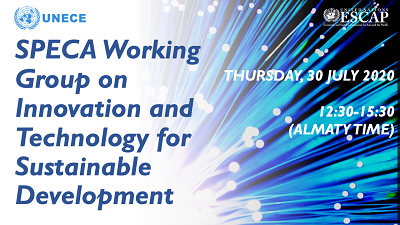
The countries of the UN Special Programme for the Economies of Central Asia (SPECA) - Afghanistan, Azerbaijan, Kazakhstan, Kyrgyzstan, Tajikistan, Turkmenistan and Uzbekistan - gathered for a virtual session of the SPECA Working Group on Innovation and Technology for Sustainable Development (WG on ITSD) organised by UNECE and UN ESCAP to discuss progress and prospects for regional cooperation to increase e-resilience, in particular in the context of COVID-19, and to enhance innovation as a driver of sustainable post-pandemic recovery and development in the region.
The inaugural session of 30 July was chaired by Mr. Abylaikhan Ospanov, Vice Minister of the Ministry of Digital Development, Innovation and Aerospace Industry of Kazakhstan. Mr. Ospanov highlighted the importance of the work of the SPECA WG on ITSD given the impact of COVID-19 and the importance of digital connectivity for all, particularly in the areas of education and public health – a theme also been put forward by the UN Secretary General. Mr.Ospanov informed that Kazakhstan is taking steps to ensure remote access for all to key Government services.
Ms. Elisabeth Tuerk, Director of the Economic Cooperation and Trade Division of UNECE welcomed this inaugural session of the SPECA WG on ITSD and praised the commitment of the SPECA countries, as shown by their recent adoption the SPECA Innovation Strategy for Sustainable Development. She also welcomed the request from Uzbekistan to undertake a UNECE Innovation for Sustainable Development Review. Ms. Tiziana Bonapace, Director of the Information and Communications Technology and Disaster Risk Reduction Division of UN ESCAP emphasised that digital connectivity have proved a lifeline for physically distanced but real-time human interactions during this pandemic. However, she noted that according to the recent survey held by ESCAP in Asia and Pacific, around 30% of households in SPECA countries do not have access to the Internet at home, and the impact on this group has been significant.
The SPECA WG on ITSD discussed SPECA countries' efforts to harness innovation and enhance regional cooperation in the area of innovation. UNECE is supporting SPECA member countries in supporting implementation of the SPECA Innovation Strategy for Sustainable Development, adopted by the SPECA Governing Council in November 2019. A science, technology and innovation (STI) gap analysis is underway in each of the SPECA countries and will help identify central common STI challenges and opportunities in the region and outline ways forward for cooperation among the SPECA countries on innovation policy to promote sustainable development, including recommendations to support a sustainable post Covid-19 recovery and transition to a circular economy, for the theme of next year’s session of the Economic Commission for Europe.
Countries also discussed possibilities to enhance seamless digital connectivity for e-resilience under the Asia-Pacific Information Superhighway (AP-IS) initiative carried out by ESCAP. To mitigate the impact of COVID-19, it was proposed to develop a framework for the post-pandemic recovery period, which would also build upon the ESCAP toolkit on e-resilience from a pandemic management perspective. The WG agreed to develop a common work plan for digital transformation in the SPECA countries and an associated e-resilience readiness index for better crisis preparedness in future.
The WG members noted with appreciation the UNECE and ESCAP support stressed the importance of digital connectivity, innovation and regional cooperation for sustainable development in the context of the Covid-19 recovery.
The WG on ITSD provides a platform for supporting SPECA countries' progress towards achieving the SDGs with a focus on the SDGs directly related to innovation and technological development. It is also a mechanism for identification, implementation and coordination of technical programmes and projects in the region while building capacity, promoting best practices and strengthening mutual understanding among the SPECA participating countries. Promoting cooperation between SPECA countries on strategic approaches to harness innovation as a driver of future sustainable development in the subregion is another important objective of the WG on ITSD.
More information and key documents of the session may be viewed at:
https://www.unescap.org/events/speca-working-group-innovation-and-technology-sustainable-development

